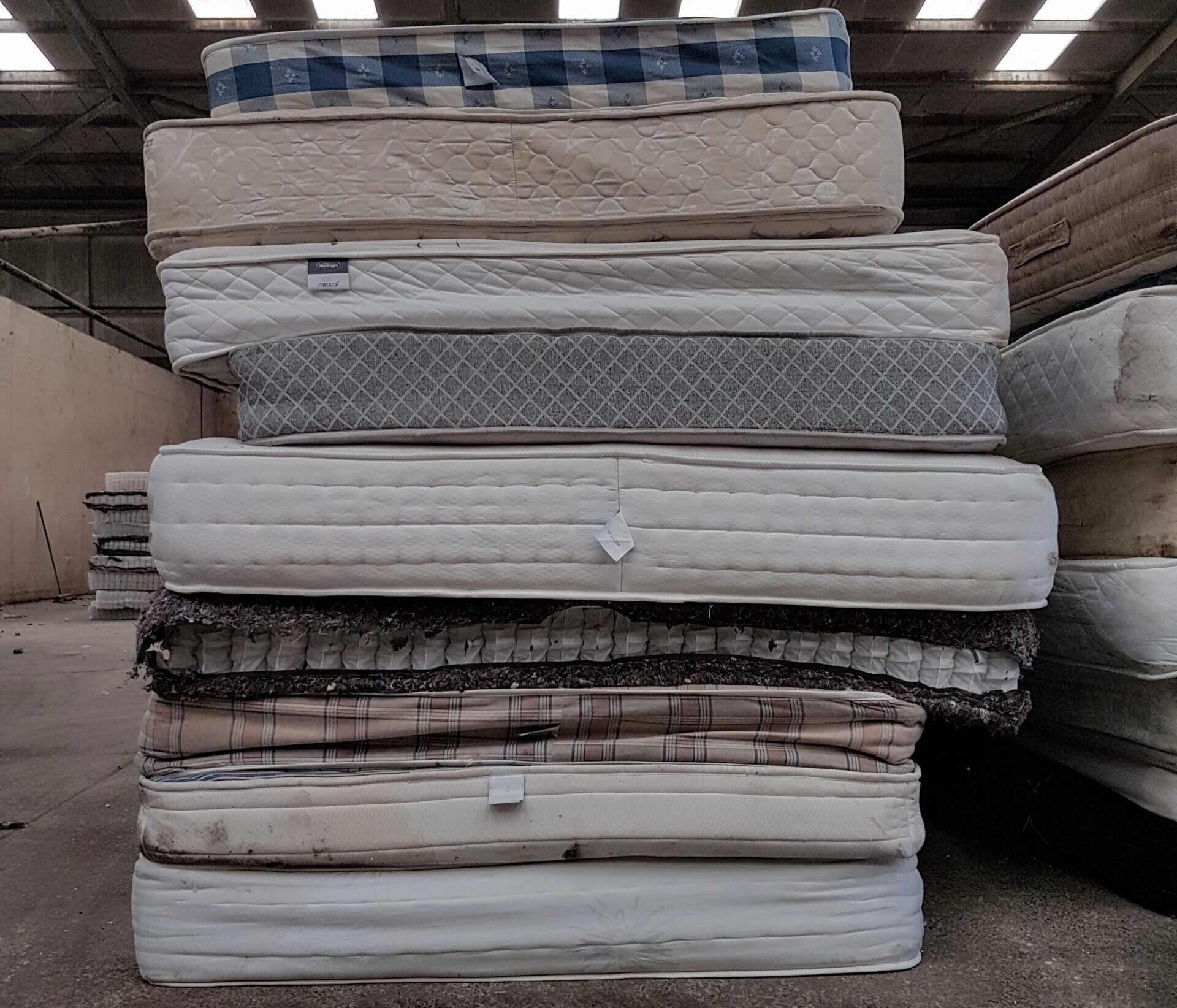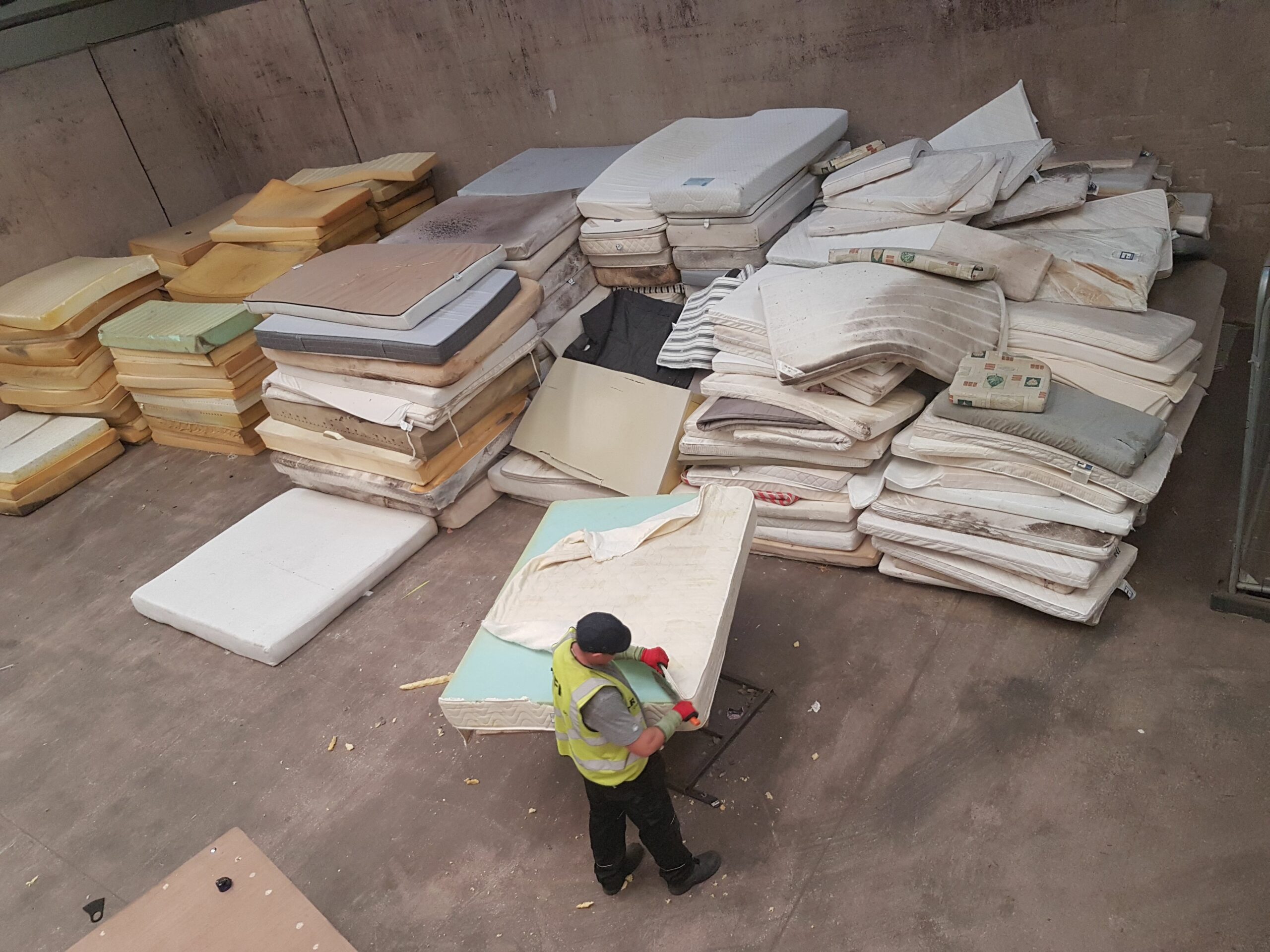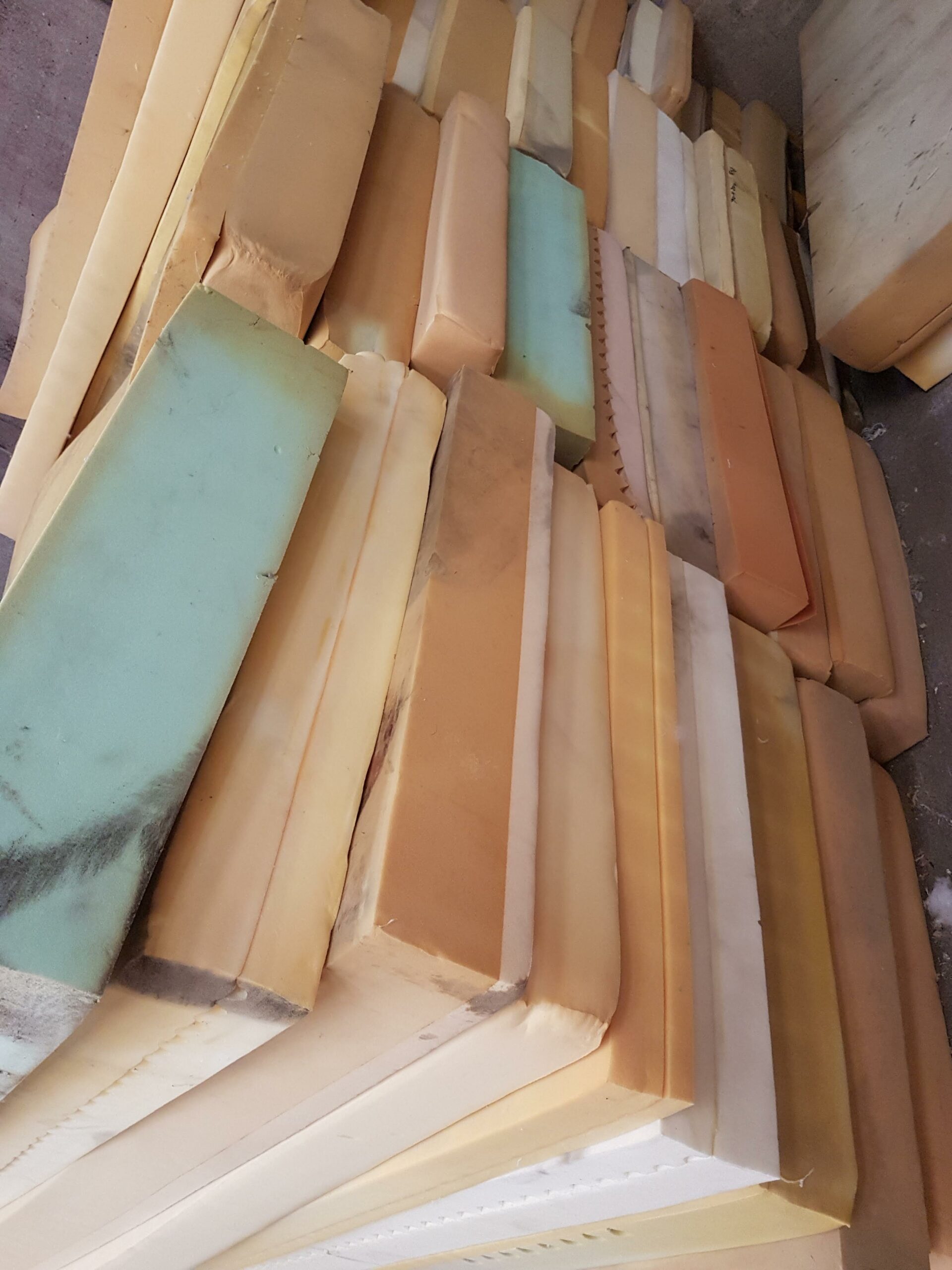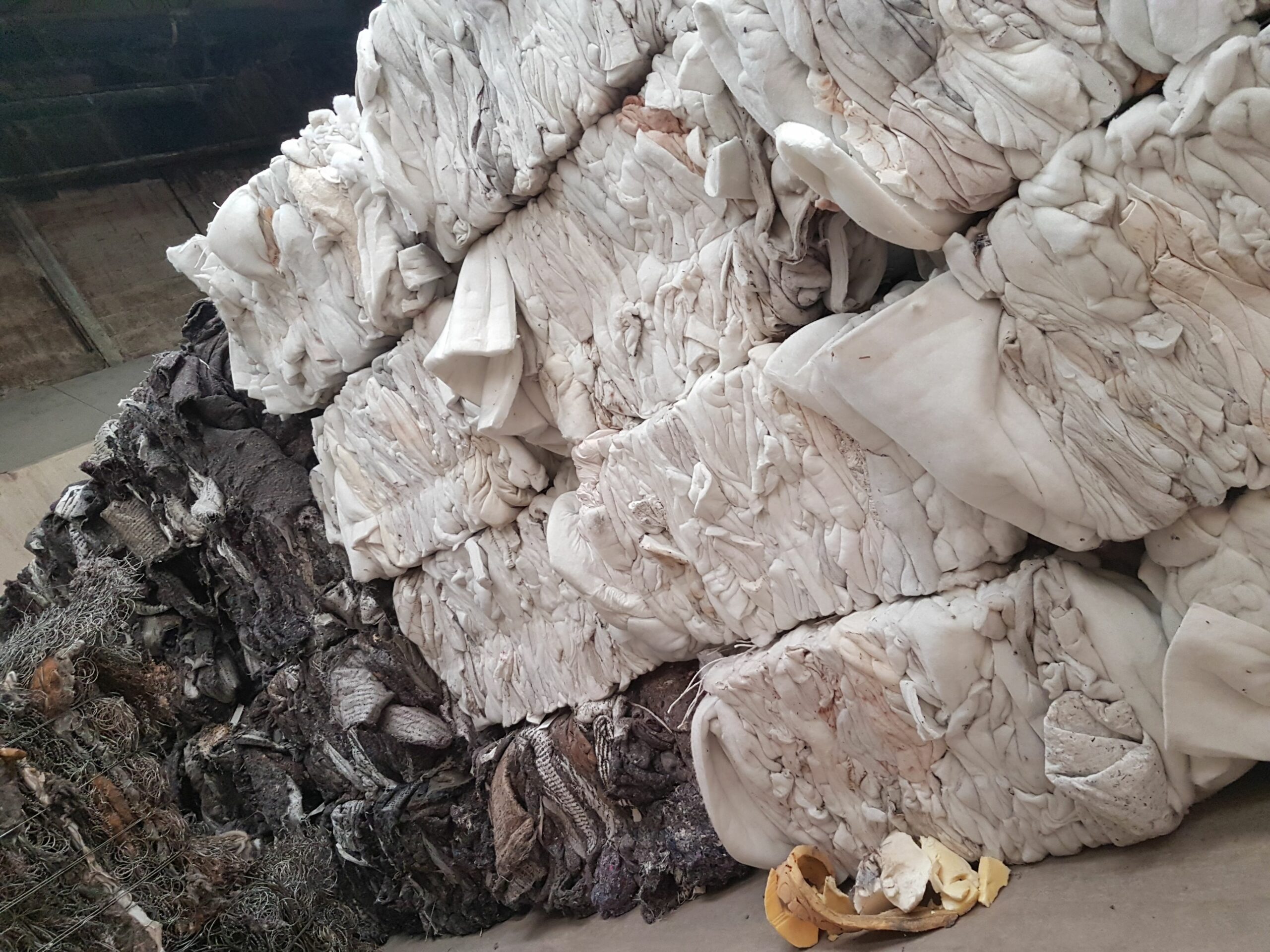When you think of a recycling centre, you probably don’t imagine a place where nature is thriving. But you might be in for a surprise. In Greater Manchester, we saw the potential in these spaces and have made it our mission to make room for nature at our waste and recycling sites.
Creating homes for insects
Our Sustainability Champions are always on the lookout for spaces to give back to nature. We’re on a mission to install planters, bug hotels or wildflowers at all 20 recycling centres in Greater Manchester. Many already boast habitats for critters.
85,000 honey bees call recycling centres home after we created hives at two sites. The bees work hard pollinating local plants which keeps the cycle of life turning. A by-product of their hard work is delicious local honey. This liquid gold sells out incredibly quickly, but if you’re lucky you might be able to find a jar in our Renew shops.
Closing the loop on food
Did you know all the food and garden waste you recycle at home is turned into compost in the North West? Because it’s made up of food scraps the compost is packed with microorganisms and nutrients which help enrich the soil it’s added to. Most of the compost is used to grow wheat on farms close by, which gets turned into bread. Producing food locally means it doesn’t need to be transported on fuel-guzzling planes, ships and trains so has a much smaller environmental impact.
The Recycle for Greater Manchester Community Fund is a pot of money awarded to amazing local projects. Some of the projects have a direct impact on improving biodiversity, like Caritas Dioceses of Salford who transform leftover school dinners into nutrient rich compost. The compost is then used to grow more food on their allotments which is given to people in the local community who struggle to access fresh food.
Turning ex-landfills into forests
Waste management has changed. Nowadays, very little waste from households in Greater Manchester goes to landfill sites. These sites were closed and covered with topsoil decades ago. Although the unruly weeds and grass that started growing on top did offer some protection to natural wildlife like insects, we knew much more could be done to encourage biodiversity in these spaces. We’ve transformed two landfill sites that have been out of use for over 40 years into forests where nature can thrive.
In Spring 2024, City of Trees planted over 750 trees at the sites in Rochdale and Stockport. All the plants introduced are native species and have been carefully curated to harmoniously coexist whilst attracting a broad mix of mammals, birds, and insects.
These new forests will join up with existing woodlands around the sites to create nature corridors for animals to move through and live in. The ex-landfill sites are already home to a wide variety of wildlife including rabbits, roe deer and foxes, with water voles, bats and a huge variety of bird species living in the woodlands close by.
As well as creating a welcoming habitat for animals, the new forests are already starting to absorb CO2. This is a positive step towards achieving our bold ambition to decarbonise waste and recycling sites. The decarbonation project is part of the Five Year Environment Plan which is striving for a carbon neutral city region by 2038.
Why is biodiversity so important?
Biodiversity impacts everything we need to survive. Microorganisms enrich the soil where we grow our food. Roots from trees and plants hold the earth together preventing landslides and absorb water to avoid floods. Even the air you’re breathing right now has been improved by plants filtering the toxins out.
A recent report into the State of Nature analysed our local environment and found a shocking decline in biodiversity. Nearly half of biodiversity in the UK has been wiped out since the industrial revolution. More pollution, more buildings, more humans, meant less space for nature.
Things are so severe the UK is ranked in the worst 10% of all countries for biodiversity. Which isn’t hard to believe as 1 in 4 mammals in the UK are facing extinction.
The Government has made a commitment to stop the loss of biodiversity by 2030. It will also protect 30% of land to support nature’s recovery. The GMCA is working on a Biodiversity Action Plan that’ll set out how we’ll contribute to the national biodiversity commitments.
The good news is we are already working to improve biodiversity in our city-region. Small actions, just like small creatures, can make a big difference. We’re continuing to protect and encourage biodiversity at the 22 waste and recycling sites in Greater Manchester, whilst providing support and funding for projects that nurture nature in our city region.
You did it, you made it to the end of the academic year! Now, you might be summer ready but are you move-out ready?
Whether you’re moving into another student house, uni accommodation or heading back home, we’ve created the ultimate guide of what to do with the stuff you don’t want anymore. From lecture notes to fancy dress costumes to old tech, here’s the rundown of how to recycle it all.

Make the most of your recycling bins. If you’re in halls, the staff will be able to explain the recycling options. If you’re in private accommodation, you can put paper notebooks, flyers, and leaflets in the paper and card bin.
Aerosols, empty perfume bottles, bleach bottles and more go into the mixed recycling. Get a reminder of all the things you can recycle at home here.
Did you know even ripped or stained clothes can be recycled? Just make sure they’re clean and dry, bag them up and take them to a clothing bank.
Most big supermarkets have them. You can also use the clothing banks for re-wearable stuff you want rid of including your pub-golf fit. Your local charity shop will take clothes in good condition, but make sure to take donations inside. Leaving bags outside closed charity shops is fly tipping.
If you don’t want to take your heavy tins and dried food with you, donate them to your local foodbank for someone else to use.
When you’re getting rid of ancient condiments from the back of the fridge, the empty plastic bottles and glass jars can go into your mixed recycling bin. Glass can be recycled infinitely, and some of those jars might be older than you! Keep them in the loop by recycling.
Most of us have a collection of broken headphones and other tech hiding in a draw. Electricals (anything with a wire, plug, or battery) can’t go into your bins at home as they can cause fires.
You’ll find battery recycling points in most big supermarkets and some campuses have vape recycling bins. Use the Recycling Locator to find your nearest public recycling point.
If you’ve got access to a car you can take furniture and large items to 20 recycling centres across Greater Manchester. Theres a space to donate reusable furniture to Renew to be loved by someone else.
No car? Charities like Mustard Tree will collect furniture for free. If the furniture is beyond fixing most councils have a bulky waste collection service, find more details on your councils’ webpage.
You can donate everything from food to books to via the Give It Don’t Bin It donation points at the end of June. Your things will be redistributed to local charities including The British Heart Foundation and local foodbanks. Since 2012 students have donated 2,118,661 tonnes of stuff that have been shared with people who need it.
Got something that’s not on this list?
You can recycle pretty much anything at our recycling centres. Even if you don’t have a car, you can walk up to the gate and hand things over to the staff for recycling.
Based next to the lake in Platt Fields Park, the Bike Hub has been working hard over the past few months to get old bikes back on the road, while at the same time giving refugees a way to get around the city.
We caught up with Zym to find out how the R4GM Community Fund has made a difference to their project.
What was the inspiration behind the project?
“The people that are using our workshop are predominantly low-income customers and there has been quite a big demand for bikes. We’ve been approached several times by aid organisations who work with refugees so see if we could help. It’s been the focus for this project to enable people to have their bikes fixed for less than they would normally have to pay or have it done for free.
“It’s a big boost to cyclists in general but particularly for people who struggle to pay for public transport and accommodation. If money’s tight, having a bike for free and knowing it’s safe to ride, whether you’re going to the job centre or an interview, we believe cycling is definitly helping people on low incomes.”
How has the R4GM Community Fund helped with your aims and ambitions?
“It has allowed us to give more attention to this section of our community and allocate appropriate resources towards it. We have been able to increase staff hours to get the bikes ready, and we’re also able to attract a bit more interest from the community in terms of bikes donated towards us. Internally as an organisation, our focus to provide refugees with bikes has meant that we have now allocated time and effort specifically to support that group.”
What has the impact been on the community as a result of the project?
“The feedback we have been getting from people who have received bikes from us is overwhelmingly positive and everyone is so happy that they have been taken care of in that respect. It means a lot to us as well, it’s very valuable and it feels quite rewarding that you are helping someone who has maybe had help refused before. So just based on that positive feedback we can see that there’s definitly a glimmer of hope and kindness and humanity going..
“It’s difficult to say how long term this will affect the community, but even if we can help a handful of people that’s a handful of people less who are struggling to get about Manchester. We’ve dispensed about 13 bikes so far. We pledged about 35 so we’re kind of mid-way through, but I also feel like this is the winter period and we’ll get probably more interest later on in the year. We’re still trying to link up with other organisations to help us reach those in need. Our focus now is getting the bikes ready for the refugees. Mid way through, I think we’re on track.”
Has there been a specific moment that you feel most proud of?
“Adil, a refugee from Uzbekistan, he’s one of the people who gravitated towards us and he wanted to volunteer with us. We were happy that he wanted to spend some time with us, learn a few things about fixing bikes. Hopefully it might lead to employment for him, I’m not sure if it’s possible to offer him employment at this stage as his English is quite limited but we can see he has the knack for mechanics and if his English gets better I’m sure he’ll be able to find employment in a bike shop. The good thing is helping him to get his English up to speed as for most refugees, not all, communication can be a barrier.”
What do you plan to do next?
“We’re going to try and carry on with our own fundraising efforts to continue the programme with refugee bikes in the future. The grant fund that we received helped us to identify the need, get links with relevant organisations and we will look at carrying on so where we know where to go with additional funding, and improving our own fundraising and marketing so we can get dedicated mechanics just for that.”
How can people get involved with the project?
“There are ways of donating, you can find out how to donate on our Facebook, Instagram and our website. We are welcoming anyone who has an old bike who wants to get rid of, so they don’t have to scrap it. We might be able to save parts from it or might be able to do it up and give it to someone who will love that bike. Currently, we’re not open to anyone for bike mechanic volunteering unless they are trained mechanics, or they’re looking to get into the profession and want to get a few more hours on the spanners so they can learn and hopefully help us fix some bikes.
“At the moment, we have two volunteers but that’s peak capacity for us to be able to do what we do and train. If there’s organisations or individuals who know someone who needs a bike definitely send them to us, we’ll try to do our best to sort them out with a bike. The best way to do that is either to ringing us, or pop in. If they need a bike, they need to be sized up so we can make sure we have a suitable bike. If the individuals live far away, maybe it’s best to call or reach out on social media first.”
Do you have an idea for a project? Apply for funding now!

Shop our range of handpicked, vintage and preloved items via our online store or eBay page to find something truly special.
You can shop in person too – pop into one of our shops at the recycling centres in Altrincham, Irlam and Oldham for a selection of affordable decorations, kitchenware and furniture.
All of the items we sell have been donated by Greater Manchester residents at our recycling centres, and the money raised goes to good causes across the city-region through our Community Fund and the Greater Manchester Mayor’s Charity.
Don’t forget that any unwanted items can be donated at the recycling centres just look for the Renew containers Renew
…And much more!
If you are replacing your mattress, you can take your old mattress to a recycling centre.
Mattresses are delivered to The Furniture Recycling Group in Bolton, where they are dismantled, ready to be recycled into something new.

1. Mattresses are collected from our recycling centres in Greater Manchester.
2. The mattresses are then delivered to the recycling facility.
3. Mattresses are dismantled by hand into 19 component parts.
This includes:



4. The separated materials are then cleaned ready for processing
5. The materials are made into new products such as:
Did you know you could put yourself, our bin crews and recycling centre staff in danger if you dispose of batteries in any of your bins at home? Read on to find out how to dispose of and recycle batteries safely.
Old batteries may seem ‘dead’ but they can cause fires in your home, bin lorries and recycling centres when they are punctured or crushed. They also contain hazardous materials which may endanger our operational staff if not disposed of correctly.
When recycling batteries, follow these simple steps to keep your home and our staff safe:
There are hidden batteries in many electrical items such as electric toothbrushes, toys, e-cigarettes, vapes, phones, laptops, and many more. You can recycle them by following the same steps above.
If you are unsure how to recycle an item, have a look at our A-Z item guide to help you recycle as much as you can and to dispose of your waste safely.
When next replacing batteries, why not buy rechargeable batteries instead? You can use them again and again, which will save you money and help you waste less.
If you’d like to find a new home for your electrical items, you could bring them to your local recycling centre (except for Chester Road and Reliance Street) and place them at the donation container which will then be brought to our Renew Hub.
Your small actions can help create a healthy more sustainable place to live and being in the loop can even save you money. Reducing how much you buy, choosing more sustainable products or shopping pre-loved can lead to big savings.
The loop, AKA the circular economy, is about reducing waste. Recycling is a really important element of the loop. We need to get the full potential of materials before we destroy them and make something new from scratch. Repairing things and using things to the maximum is going to save you money.
This blog busts common myths around recycling and reuse.
My actions won’t make a difference – False
The average Greater Manchester resident throws away half a tonne of waste every year. We each also produce around 13 tonnes of C02 and greenhouse gasses each year, double the world average.
Only 48% of our waste is recycled, meaning we’re throwing away millions of tonnes of recyclable things every year. This wastes resources and means having to spend huge amounts of energy re-mining for materials we could have reused, further eating into dwindling natural resources.
Running out of resources isn’t something I need to worry about in my lifetime – False
If we continue as we are, fossil fuels could run out by 2060. Lithium, the element used in batteries could be totally used up in 17 years. Electric vehicles are a fantastic way to reduce the amount of fossil fuels used, but lithium is a vital component in electric vehicle batteries.
If the UK recycled all of the single use vapes we currently throw away, in 1 year we’d have enough lithium for 1200 electric vehicle batteries.
Reusable products are more expensive – False
Read our blog on how sustainable swaps can save your family £1670 a year here.
Sustainable and reusable products are built to last. They are slightly more expensive due to the quality, but when you factor only having to pay once instead of every week, the savings quickly add up. If you switched to reusable kitchen roll, you could save £245 in a year. As well as benefiting your pocket, you’re helping to reduce the amount of rubbish we produce and reduce the amount of materials taken from the earth.
A recycling symbol on packaging automatically means I can recycle it – False
There are loads of different versions of recycling symbols on packaging and it can be confusing.
This is the most common symbol you’ll see and it’s designed to encourage people to recycle. However, each local authority recycles differently, so it’s important to check www.recycleforgreatermanchester.com/what-do-i-do-with/ if you can put the packaging into your household recycling bins, if it needs to be taken to the recycling centre, or if it needs to go in general waste.
The Green Dot shows the company making the packaging has paid money towards a recycling scheme. It doesn’t mean that the packaging can be recycled or is made from recycled materials.
This symbol is found on electrical items and shows that they can’t be put into your general waste bin. Electrical items need to be disposed of at your local recycling centre so the precious metals inside can be reused. You can also check if you can return electricals to the store you bought it from for recycling. Electrical waste causes fires and by not recycling, we lose precious resources that could have been turned into new devices.
We urgently need to change from our current system of buying things and throwing them away. Reducing the amount of stuff we use and keeping precious resources in use as long as possible, before recycling them fully, is vital to combat climate change and resource scarcity.
Be in the loop by repairing instead of throwing away. Electronic waste is a huge problem in the UK, with so many appliances being thrown away before they’re truly broken.
Have you gone to heat up your tea and found your microwave sparking? Instead of forking out £80 on a new one, this £5 repair could be the solution to get your microwave back spinning safely.
If you’re certain no foil has found its way into the machine, a damaged waveguide cover might be the cause of the sparks. This small rectangle of silver card allows the microwaves rays to heat the food. If it gets dirty or damaged it can cause sparking and result in problems heating food. There’s no need for a full replacement appliance. Save yourself money and save the planets resources.
This guide will take you through the steps to replace your microwave waveguide cover. If you’re in any doubt about the safety of your appliance, always get a qualified technician to investigate for you.
*Always make sure electronics are unplugged before investigating or working on them*
Step 1:
Have a look at the waveguide cover.
It’s a silvery rectangle usually on the right-hand side, inside the machine. Is it looking dirty? Is it torn? Are there scorch marks from the sparks? If so, it needs replacing.
Step 2:
Order a replacement waveguide cover.
Go online and search ‘microwave waveguide cover’. You’ll find some designed to fit specific makes and models. We think it’s easiest to buy a sheet and cut the new cover to size.
Step 3:
Take out your old waveguide cover and trace the shape onto the new cover card.
Step 4:
Cut round your traced outline.
Step 5:
Fit the new waveguide cover, plug the microwave back in.
That’s it, all fixed! Now find yourself a treat to test your handy work and breath a sign or relief that you’ve not needlessly thrown away a microwave for the sake of a few inches of silver card.
Repair your clothes with these five hacks.
Save yourself money and keep your favourite items in your wardrobe rotation with these super easy hacks.
Making textiles is massively resource intensive: it takes 2,700 litres of water to make a t-shirt, which is as much drinking water as 1 person needs for 2.5 years! If we all doubled the number of times we wore an item of clothing, we would reduce greenhouse gas emissions by 44%. These hacks will help you repair your clothes, so you can wear them for as long as possible.
If you don’t have the time to make repairs, you can support a sustainable business and get them to extend the life of your clothes. Here are our favourites: